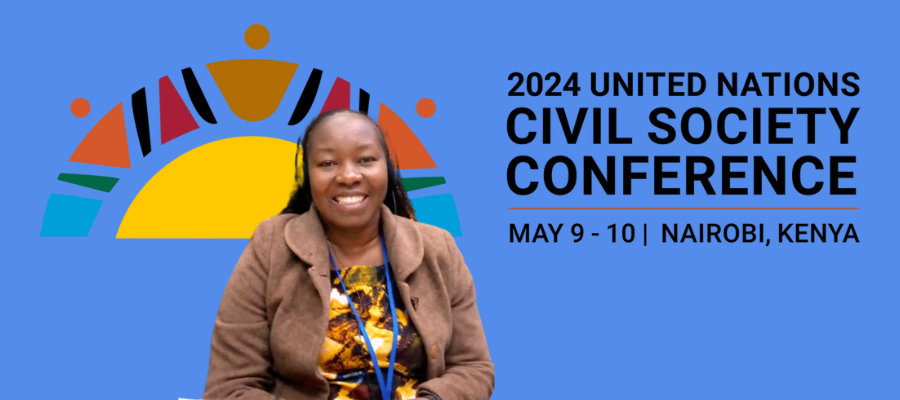
We had the opportunity to have two students from Loreto Msongari together with their teacher as part of our delegation to the United Nations (UN) Civil Society Conference 2024 that was held at the UN Gigiri, Nairobi on May 9 – 10, 2024. As members of the Working Group on Girls, we also attended the Girl Deliver meeting held a day before the conference. Girl Deliver is a coalition of NGOs working with girls to advocate for their rights. The students, together with their teacher attended the meeting with us. Read Phylice Nyabate Nyangera’s reflection below.
My name is Phylice Nyabate Nyangera, a teacher at Loreto Convent Msongari School, a school led by the Institute of the Blessed Virgin Mary (IBVM). My journey to the UNCSC 2024, started with a call to be the chaperone to two very intelligent students; Latifa and Keendi.
I do not think I was well prepared for the experience that awaited me. On May 8th, we met with the other members of Girls Deliver in Kilimani. The experience was enlightening as it opened my mind to the fact that girls of all ages can join hands to make changes to issues affecting them. It was obviously clear that the issues were somewhat interrelated. Any global issue affects all aspects of the people’s lives.
The United Nations before this time was a giant word. I never had a hold of what it really did because in my little mind I always felt like the UN had seen better days but not effective at this point in time. But staying in those conference rooms, experiencing each diplomat’s pain in their voice as we all struggled to make our voices known, our pains heard, and our fears addressed, I learned that the process of change is long, engaging, and sometimes painful. However, ultimately, despite its slow pace, many people share a mindset of change. The main hindrances are often a few policymakers, individuals with stereotypical viewpoints, or those entrenched in orthodox ways of life.
I felt that all the groups were willing to go to any length to address issues such as FGM, education, justice, peace, drugs, and the sustainability of all the SDGs. In the small discussion groups, the following policies and popular initiatives were addressed: funding organizations that work towards the SDGs, our delegation was engaged in children’s rights issues, implementation of justice in institutions, revision of drug policies, and offering social protection and justice to vulnerable groups.
In the ImPACT coalition groups, I heard most delegations figuring a way of sustainably running the agendas of the UN.
- The first one that I attended was focused on Peace and Justice in the Institution and we addressed SDG16 and identified areas of weaknesses that perpetuate injustices in the society: policy implementation gaps, accountability issues, lack of integrity, abuse of power, insufficient policies to encourage transparencies. Our delegation proposed integrating moral values training into school curricula and advocated for establishing an agency dedicated to transparency and accountability. The Chair encouraged all participants to uphold moral standards within their respective institutions, emphasizing our roles as ambassadors for these initiatives.
- The second was focused on addressing Children Rights and Participation. I learned that often we view issues related to children’s rights from a different aspect and can sometimes exacerbate problems rather than alleviate them. Hearing directly from the children hit deep. I discovered that many children still lack basic necessities due to poverty.
- The third one that I attended was the Drug Policy for the Future. We looked at drug issues as a generational problem that requires comprehensive, intentional, and staged solutions. I was impressed with the delegates’ positivity and strong desire to address these drug-related issues.
- The last one focused on Social Protection addressing issues related to child protection, vulnerable populations, and the needs of slum residents. The images that were projected were disturbing highlighting the urgent need for action. However, I was encouraged to see the recommended changes, even though many were still in their initial stages. There was a glimmer of hope for progress.
From the CSC, my desire to address SDG 1: Poverty, has become more pronounced. While I am still at the onset, I plan to tackle poverty comprehensively. I look at poverty as a barrier to achieving all other SDGs. Poverty perpetuates inequality, exacerbates gender-based issues, and limits resources to address climate issues. I am particularly concerned about its negative subconscious effects, which can lead to mental stagnation and hinder progress towards fulfilling the SDGs.
During the plenary session led by UN Women Deputy Executive Director Nyaradzi Gumbonzvanda, I learned about various support programs that UN Women offers to Member States, as well as the preparation for the Summit of the Future, and the Beijing +30 commemoration. The issues discussed were all related to the lack of sufficient empowerment for women. The Girls Pact was a clear expression of feminism and gender equality. For the first time I heard my ideas echoed by the rapporteur in the main plenary commission, and the compiled documents underscored the urgent need for action and the pending implementation of our aspirations and appeals.
A special thanks to the Institute of The Blessed Virgin Mary, The administration of Loreto Msongari School, our coordinator Sr. Janet Palafox and the UNCSC 2024 delegation. I pray that our impact to the society can be felt in all the things we touch and do. God’s blessings on all of us.
Author: Phylice Nyabate Nyangera (Teacher at Loreto Msongari School, Nairobi Kenya)
